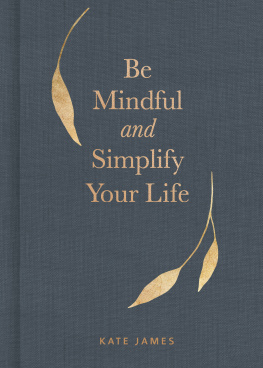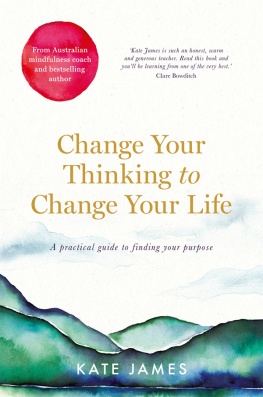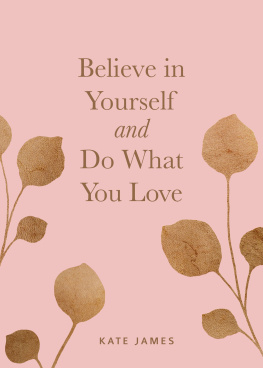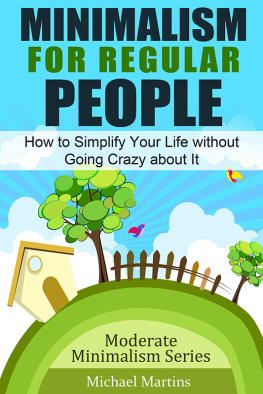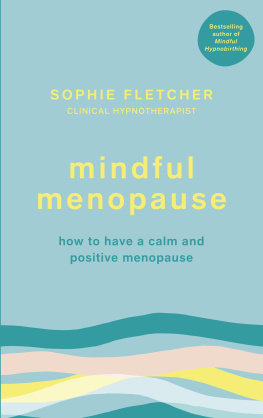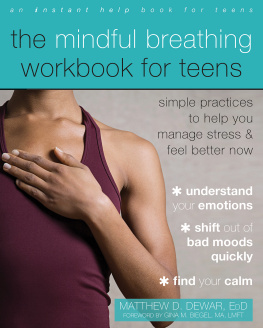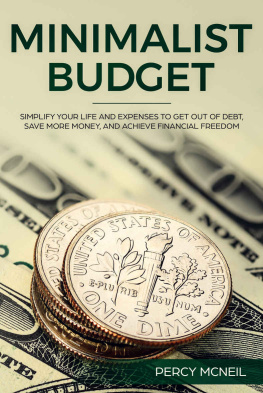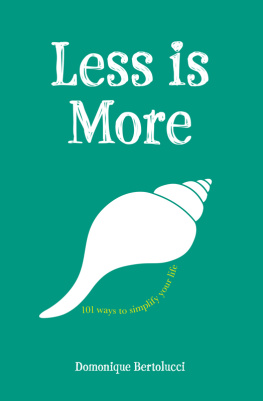Praise for Kate James and Total Balance
I absolutely adore Kate. She is a highly skilled, generous, and enormously gifted business coach, especially for those who dont traditionally consider themselves business people. Clare Bowditch, Big Hearted Business
Kate really walks the talk and is clearly someone who has a great deal of expertise to share. Thank you, Kate! Robert Gerrish, Flying Solo
Kate James is a generous, creative coach who is passionate about helping others fulfill their dreams and brilliant at helping people move through both inner and outer obstacles. Elise Bialylew, Founder of Mindful in May
I would not hesitate to recommend Kate James of Total Balance to anyone who has goals and dreams, be it for life or business, that they want to achieve and dont know where to begin, or how to get there. Jodie Holmes, Director of Seaside Creative
Put simply, working with Kate helped me to get clearwhich has been nothing short of life changing. Leanne Clancey, Food & Travel Writer
Contents
Introduction
Mindfulness is about being aware, being accepting, and being kind to yourself and others as you navigate your way through life. You could say that living mindfully is learning to value being as much as you value doing.
In the work I have done with clients over the past eighteen years, Ive observed that the happiest people usually keep things simple. They know how to enjoy the present, they spend time reflecting on their choices, and they are proactive about making changes in their lives. They do all of these things in a mindful way. They accept that life wont always be easy, and theyre willing to roll with the punches when things dont go to plan. Crucially, they live on their own terms, without being overly caught up in what everyone else is doing.
These people are proof that one of the greatest ways to encourage happiness is to fully embrace mindfulness.
The basic principles of mindfulness include:
Awareness (of your senses, breath, your body, your environment, your thoughts, and your physical experience).
Being non-judgmental (allowing things to be as they are).
Practicing compassion and acceptance (learning to be considerate of ourselves and others).
Savoring the moment (not worrying about what happened before or what might happen next).
Within this little book, Ill introduce my version of what it means to live mindfully. Ill provide you with practical tips on how being mindful can lead to a less complicated and more fulfilling life.
Explore the book in your own way. Read it from front to back if you feel so inclined, or open it at a section that draws your attention. Youll find that certain aspects of mindfulness appeal to you more than others, and youll know intuitively which areas need to be addressed first. The most important thing is to be open to the idea of being mindful in all areas of your life. The very fact that youre reading this is a good start: youve set the intention, so you are already on your way.
1.What is mindful living?
Understanding mindfulness is only a starting pointto live mindfully, you must take the basic principles outlined in the Introduction and apply them every day. This means:
Making contact with the present moment.
Being aware of your thoughts and feelings.
Being mindful of your behaviors and actions.
Taking a mindful approach to longer-term planning.
Making a mindful contribution to something bigger than yourself.
In many ways, we can use the word mindfulness interchangeably with awareness. Living a more mindful life means paying attention to the choices we make, rather than operating on autopilot.
When we begin to do this, we gain clarity about what really matters and we strip away some of the complexity of life.
Initially, you may find that introducing new ideas feels less simple, but in the long run, youll recognize that mindful living means being more aligned with your personal values and ultimately discovering a way of life where youre more at peace with things as they are.
2.Are you living mindfully?
How mindful are you? Give yourself one point for every yes, half a point for a maybe, and zero for every no.
Im aware, at least some of the time, of being in the moment.
I am aware of my thoughts much of the time.
I make an effort to be compassionate with myself and others.
Im okay with not being perfect.
I accept that I cant control life, and I know how to let go when things dont go my way.
Im okay with having difficult feelings sometimes.
When something good is happening in my life, I take time to appreciate it before moving on to the next thing.
I notice changes in my body when my emotions change, like my heart racing or my muscles tensing if I feel stressed.
I occasionally spend time alone to take stock of whats important.
When Im walking outside, Im aware of my surroundings.
I know how to fully experience my senses.
I listen to my intuition.
When I eat, I really taste my food, and I only eat until Im full.
I am a good listener.
Im able to take care of myself as well as I take care of others.
I know how to forgive myself and other people when things have gone wrong.
I feel confident about the way I manage the practical aspects of my life, such as my career, my finances, and my living environment.
I am able to balance enjoying the here and now with mindfully planning for the future.
Im able to accept that life will be a mix of challenges and happy experiences.
I make conscious choices about how I treat the environment.
/20
If you scored 15 or over, youre more mindful than most people. Read through the tips, and maybe consider gifting this book to a friend who needs it more.
Anywhere between 10 and 15, youre doing okay, but you could do with some positive change. Flip through the book for ideas.
If you scored 10 or below, you might benefit from some support from a mindfulness coach or psychologist, as well as trying the tips included here.
The most important thing is getting started, so make sure you complete one action step this week.
3.The opposite of living mindfully
The opposite of mindfulnessand the way we are all prone to think particularly during challenging timesis mindlessness .
Have you ever walked into a room and forgotten why you went there? Forgotten to turn the car headlights on (or forgotten to turn them off)? Do you feel like youre usually reacting to things rather than working on a plan? How many times have you found yourself distracted while in conversation?
These days, there are so many demands on our time and so much information overload that its increasingly challenging to stay centered, calm, and focused.
Instead, we may feel anxious, vague, or off-balancelike were always catching up, or like the proverbial hamster in a wheel. And thats no way to live.
The only way to break that cycle is to consciously choose to live more mindfully, and one of the simple ways to begin to do this is to observe yourself throughout your day.
Try this
Set a reminder in your calendar or an alarm on your phone to ring every two hours for the next couple of days.
When the alarm goes off, check in and observe yourself as though from a distance. Check your posture, your stress levels, and your mood. Are you being mindful or mindless in your approach to your day and the people around you?

